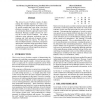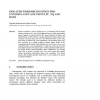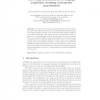1846 search results - page 5 / 370 » Computational Model of Speech Understanding |
UAI
1997
13 years 11 months ago
1997
The Lexical Access Problem consists of determining the intended sequence of words corresponding to an input sequence of phonemes (basic speech sounds) that come from a low-level p...
PRL
2002
13 years 9 months ago
2002
It has always been difficult for language understanding systems to handle spontaneous speech with satisfactory robustness, primarily due to such problems as the fragments, disflue...
TASLP
2002
13 years 9 months ago
2002
We present a spectral domain, speech enhancement algorithm. The new algorithm is based on a mixture model for the short time spectrum of the clean speech signal, and on a maximum a...
IFIP
2004
Springer
14 years 3 months ago
2004
Springer
: Speech recognition is always looked upon as a fascinating field in human computer interaction. It is one of the fundamental steps towards understanding human cognition and their ...
TSD
2009
Springer
14 years 4 months ago
2009
Springer
Abstract. The discovery of words by young infants involves two interrelated processes: (a) the detection of recurrent word-like acoustic patterns in the speech signal, and (b) cros...



